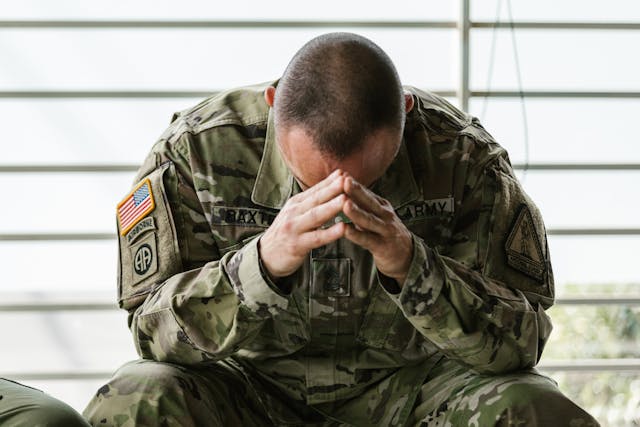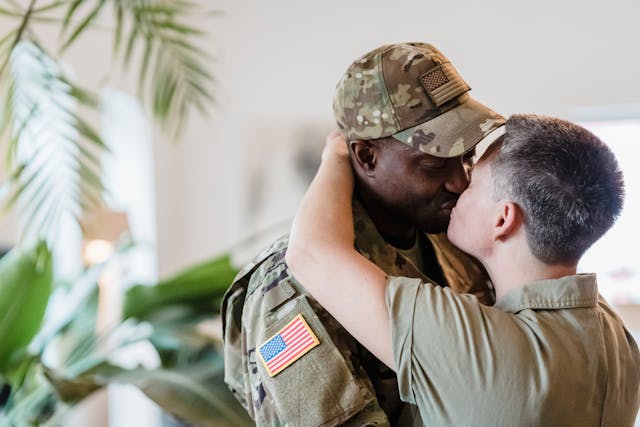
Dual diagnosis refers to the coexistence of substance abuse and mental health disorders, presenting significant challenges for veterans. For many, service-related experiences, such as combat exposure or prolonged stress, increase the likelihood of developing conditions like PTSD and depression. These mental health issues often intertwine with substance abuse, as veterans may turn to alcohol or drugs as a way to cope with emotional pain or trauma. Managing substance abuse and mental health as a veteran requires addressing these issues simultaneously, as untreated mental health conditions can fuel addiction and vice versa. Identifying and treating dual diagnosis is essential for improving quality of life. Veterans often face barriers such as stigma, lack of awareness, and limited access to resources. A comprehensive approach tailored to their needs can help break this cycle and foster lasting recovery.
Why Veterans Are at Higher Risk for Dual Diagnosis
Veterans face a heightened risk for dual diagnosis—concurrent mental health and substance use disorders—due to several factors. Combat stress and exposure to traumatic events can lead to conditions like post-traumatic stress disorder (PTSD). The military culture often emphasizes resilience and self-reliance, which may discourage seeking help for mental health issues. Transitioning to civilian life introduces additional challenges, such as adjusting to a less structured environment and finding new social support systems. These stressors can increase vulnerability to substance abuse as a coping mechanism.
The stigma surrounding mental health in both military and civilian contexts further hinders veterans from accessing necessary care. According to the U.S. Department of Veterans Affairs, approximately 20% of veterans with PTSD also have a substance use disorder.

Signs and Symptoms of Dual Diagnosis
Dual diagnosis manifests through a combination of behavioral, physical, and emotional indicators. These symptoms can overlap, making it challenging to distinguish between substance abuse and mental health conditions. Also, they may mask one another, complicating diagnosis and treatment efforts, particularly for veterans. Here are some common signs:
-
Behavioral Indicators
-
-
Difficulty maintaining relationships or employment.
-
Impulsive actions or risk-taking behavior.
-
Avoidance of responsibilities or social isolation.
-
-
Physical Indicators
-
Persistent fatigue or unexplained weight changes.
-
Insomnia or erratic sleep patterns.
-
Frequent illnesses or neglect of personal hygiene.
-
-
Emotional Indicators
-
Intense mood swings or persistent irritability.
-
Feelings of hopelessness, anxiety, or paranoia.
-
Emotional detachment or numbness.
-
For example, a veteran coping with PTSD might exhibit hypervigilance coupled with alcohol abuse to “calm nerves.” Symptoms of substance dependency, like withdrawal, can mimic anxiety disorders, further complicating assessment. Addressing these intertwined issues with specialized care is crucial for recovery.
Managing Substance Abuse and Mental Health as a Veteran
Treating substance abuse without addressing underlying mental health challenges might lead to relapse, while untreated mental health issues can worsen addiction. Therefore, combining therapy, medication, and support groups creates a comprehensive recovery plan.
Therapies like cognitive-behavioral therapy (CBT) help identify triggers and develop healthier coping mechanisms. Medication can stabilize mental health symptoms, such as anxiety or depression, enabling individuals to engage more effectively in treatment. Support groups tailored to veterans provide a sense of understanding and shared experiences that foster recovery.
Taking the first step toward seeking help is often the hardest but also the most impactful. Reaching out to specific programs or veteran-focused healthcare services can lead to a comprehensive recovery plan. Veteran-specific treatment options cater to the unique needs of those who have served. These programs frequently include trauma-informed care and peer support, both of which are highly effective.

The Role of Family and Community in Recovery
Family and community support play a significant role in helping veterans manage dual diagnosis and achieve long-term recovery. Family members often provide emotional support, stability, and encouragement. Their involvement in therapy sessions or support groups strengthens recovery and fosters better understanding. On the other hand, family dynamics can sometimes create challenges, particularly when misunderstandings or unresolved conflicts arise. Open communication and professional guidance are often needed to navigate these situations effectively.
Community resources also serve as a lifeline for veterans. Peer support groups, for instance, offer a sense of belonging and shared understanding that can be transformative. Furthermore, organizations like The National Association of American Veterans, Inc. (NAAV) connect veterans to peer networks, counseling, and specialized treatment programs. However, to provide ongoing support to veterans managing dual diagnosis, organizations like the National Association of American Veterans (NAAV, Inc.) rely on monthly donations. Your contribution can directly fund critical resources and programs that help veterans on their path to recovery.
Veteran-Specific Treatment Programs: What to Look For
Veteran-specific treatment programs address the unique needs of those who have served, focusing on specialized care for mental health and substance abuse. Resources like the Department of Veterans Affairs (VA), non-profit organizations, and community mental health centers offer services tailored to veterans. Word-of-mouth recommendations can also connect veterans with adequate programs.
Features of these programs often include trauma-informed care, Cognitive Behavioral Therapy (CBT), and group therapy sessions designed to build peer support. Substance abuse counseling and advanced methods like Eye Movement Desensitization and Reprocessing (EMDR) address PTSD and related issues. Managing substance abuse and mental health as a veteran often requires a combination of these approaches to achieve comprehensive recovery.
Some veterans face challenges in accessing these programs. Limited availability, long wait times, and geographic barriers can make it difficult to receive timely care. For those without VA benefits, costs may also pose a hurdle.
Coping Strategies for Veterans Managing Dual Diagnosis
Managing dual diagnosis as a veteran requires practical strategies and consistent effort to improve well-being. Self-care is a cornerstone of recovery.
-
Practice mindfulness: Engage in breathing exercises or meditation to reduce stress and manage intrusive thoughts.
-
Maintain physical activity: Activities like walking, yoga, or strength training help regulate mood and improve overall health.
-
Establish a routine: A structured daily schedule promotes stability and reduces triggers for substance use.
-
Limit substance triggers: Avoid situations or environments that encourage alcohol or drug use.
-
Seek creative outlets: Express emotions through art, writing, or music to channel feelings productively.
Veterans often benefit from connecting these strategies with their military training, such as using discipline to stay on track with goals. Small, consistent steps like practicing mindfulness daily or setting a workout schedule can create long-term positive change.

Breaking the Stigma Around Seeking Help
Veterans often feel reluctant to seek treatment due to stigma. In military culture, showing strength and resilience is deeply ingrained, making it hard to admit needing help. Civilian perspectives can sometimes lack understanding of the unique challenges veterans face, adding to feelings of isolation and hesitation.
Open conversations about mental health in veteran groups can normalize seeking treatment. Public education campaigns can reduce misunderstandings in civilian society and foster empathy. Families and friends can also encourage veterans by offering support without judgment.
For this reason, sharing success stories from veterans who have sought help and achieved recovery can be powerful. Hearing about someone who overcame a dual diagnosis and regained control of their life can inspire others to take that first step. Seeking help isn’t a sign of weakness—it’s a courageous decision that paves the way for better health and well-being.
Final thoughts
In conclusion, addressing managing substance abuse and mental health as a veteran requires a comprehensive approach. By combining therapy, medication, and support groups, veterans can find effective solutions tailored to their needs. Family and community support play a major role in creating a positive recovery environment, while organizations like NAAV provide essential resources. Breaking stigma is just as important as it encourages veterans to seek the help they deserve. Recovery is achievable through consistent effort, self-care, and access to specialized programs. Taking the first step can lead to meaningful change and a healthier, more fulfilling future for veterans.
Author’s Bio: Pat Crilley is the Executive Director of Harmony Ridge Recovery Center West Virginia, where he leads the organization in providing high-quality, evidence-based treatment for individuals struggling with substance abuse. With extensive experience in the field, Pat is committed to ensuring that the center delivers effective and compassionate care. His leadership has reinforced Harmony Ridge’s reputation as a trusted substance abuse treatment provider in the region, helping individuals achieve sustainable recovery and improved well-being.
Photos used:
https://www.pexels.com/photo/photo-of-person-in-green-and-brown-camouflage-uniform-7467847/
https://www.pexels.com/photo/photo-of-man-in-military-uniform-7468260/
